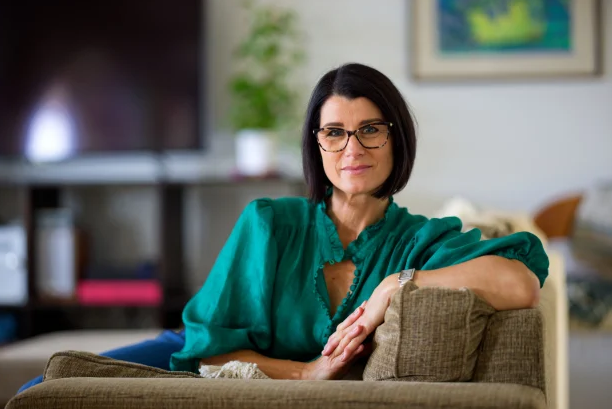Unwell for years with headaches, brain fog, anxiety, achy joints and repeated infections, Vicki Smith didn’t realise most of her health problems were connected to menopause. Now 52, she looks back on her years of debilitating health issues with regret. She repeatedly sought medical assistance and even consulted a specialist women’s health GP, but she thinks doctors’ views of her health problems were skewed because she had been diagnosed with clinical depression when she was younger. None suggested menopause might be affecting her health.
“For years prior to getting a menopausal hormone therapy prescription, I felt as though I was losing my mind,” she says. “At times it was like I was having a nervous breakdown and other times I was convinced I had dementia.”
A well-paid business development professional employed for many years in a medium-sized firm, Smith had felt increasingly unsupported in the workplace, but the circumstances made it impossible to ask for a reduced workload. Early this year, feeling increasingly weary and ill, she resigned.
The Association of Superannuation Funds of Australia (ASFA) in March estimated the superannuation of one in seven Australian women would be adversely affected by menopause through taking time out of the workplace or retiring early, potentially losing as much as $60,000 in retirement savings.
ASFA chief executive Mary Delahunty says 160,000 Australian women enter menopause each year. The ASFA report found that as a direct result of menopause about 20,000 women would at some point move from full-time to part-time work; 10,000 would leave work and return later and 4000 would retire.
“Each of these actions will have a significant and detrimental impact on their individual retirement outcomes,” Delahunty says.
Senate inquiry
There is little hard Australian data on menopause, but British surveys suggest one in four women consider leaving work when they are affected by menopausal symptoms.
Already earning less on average than men, as the recent Workplace Gender Equality Agency pay gap data revealed, women’s earning capacity is often significantly interrupted by childbirth, childcare and family responsibilities, as well as menopause, leaving Australian women with substantially less retirement security than men.
A federal Senate inquiry will this year look into issues relating to perimenopause and menopause and 138 submissions have already been lodged, by super funds, unions, medical and social organisations, government departments and many individual women.
The ASFA submission proposes the expansion of the National Women’s Health survey to collect data to better understand the effects of menopause on women’s employment.
“I’m so glad we’ve reached a stage where we’re able to say the words out loud without blushing,” Delahunty says. “This has been a big and dramatic year for the conversation around menopause and we are really keen to keep highlighting that this can have an impact on retirement savings.”
Economic loss
The Australian Institute of Superannuation Trustees looked at the extent of the financial impact of menopause in its pre-budget submission for 2023-24. It noted that “by the government’s own estimates, 28 per cent of menopausal women will have symptoms severe enough to impact their participation in the workforce”.
That meant the working lives of 194,360 women then in the 50-54 age group were disrupted by menopausal symptoms, the submission said, resulting in a possible collective economic loss of $15.2 billion a year in forgone earnings and super. With an average early retirement of more than seven years, the institute calculated the combined shortfall came to more than $112.2 billion in forfeited earnings.
Resigned to the loss of income arising from her menopause health difficulties, Smith says she expects to be out of work for six months or so, forfeiting about $100,000 of income.
She resigned abruptly and her thinking was clouded at the time, so she didn’t think to take some of her three months’ sick leave. Her long service leave was paid out, but if she had instead taken the long service leave before resigning, she would have earned super on it.
“I didn’t necessarily have to give up work,” she says. “I just needed the right medication; I needed the right help. In the end I just couldn’t function properly. My brain just wasn’t working. I felt terrible.”
Progressive policies
Menopause Friendly Australia, a proprietary limited company, provides assistance and accreditation to companies looking to create workplaces responsive to the needs of menopausal women.
Some super funds have already introduced progressive menopause policies such as menopause leave days, and other companies are seeking guidance.
“We need to look at what the systemic reasons are for women leaving the workforce,” says Menopause Friendly Australia CEO Grace Molloy. She notes that 45 per cent of Australian women who retired before 55 cited health as a reason.
“At the moment women leave work 7.4 years earlier than men, and that not only contributes to the superannuation gap for women but also to the lack of women in leadership roles,” she says.
Menopause Friendly Australia is less than a year old, she adds, but big businesses that have signed on include the Commonwealth Bank, KPMG, Accenture and BHP.
BHP Group health, safety and environment officer Elsabe Muller says the company is making changes to support employees coping with menopause.
“Despite its prevalence and complex impacts, menopause is rarely talked about at work and we need to change that,” she says. “We recently ran a campaign across our business globally aimed at building awareness, reducing stigma and opening that dialogue with our workforce.”
